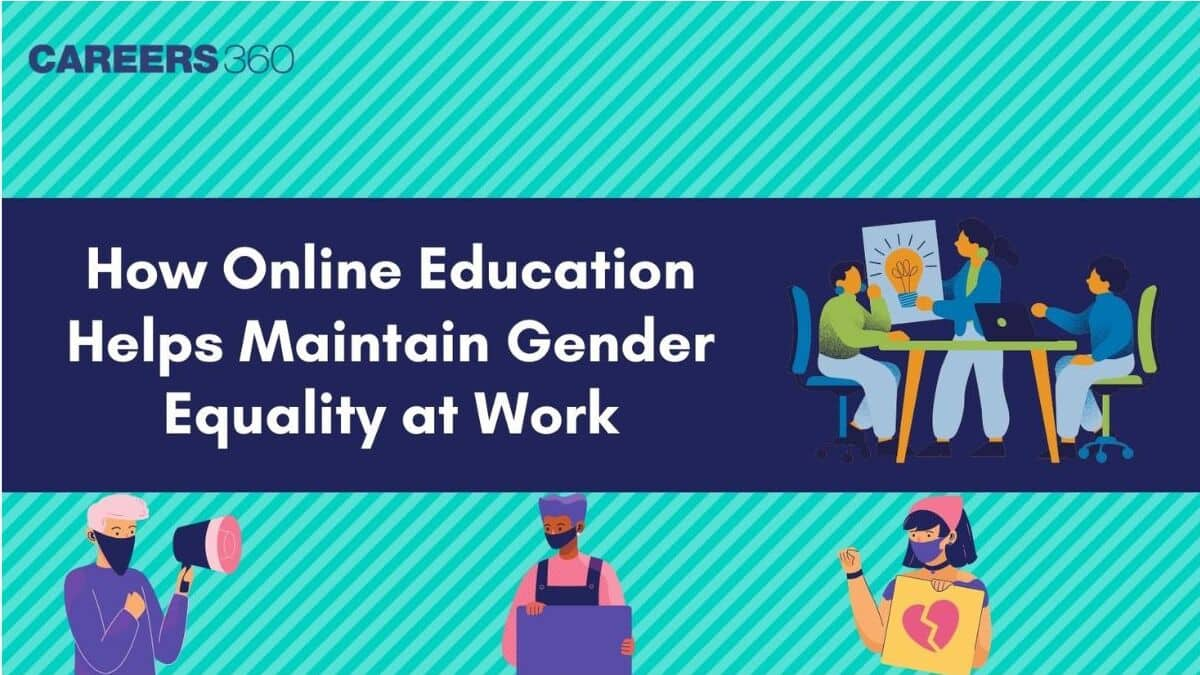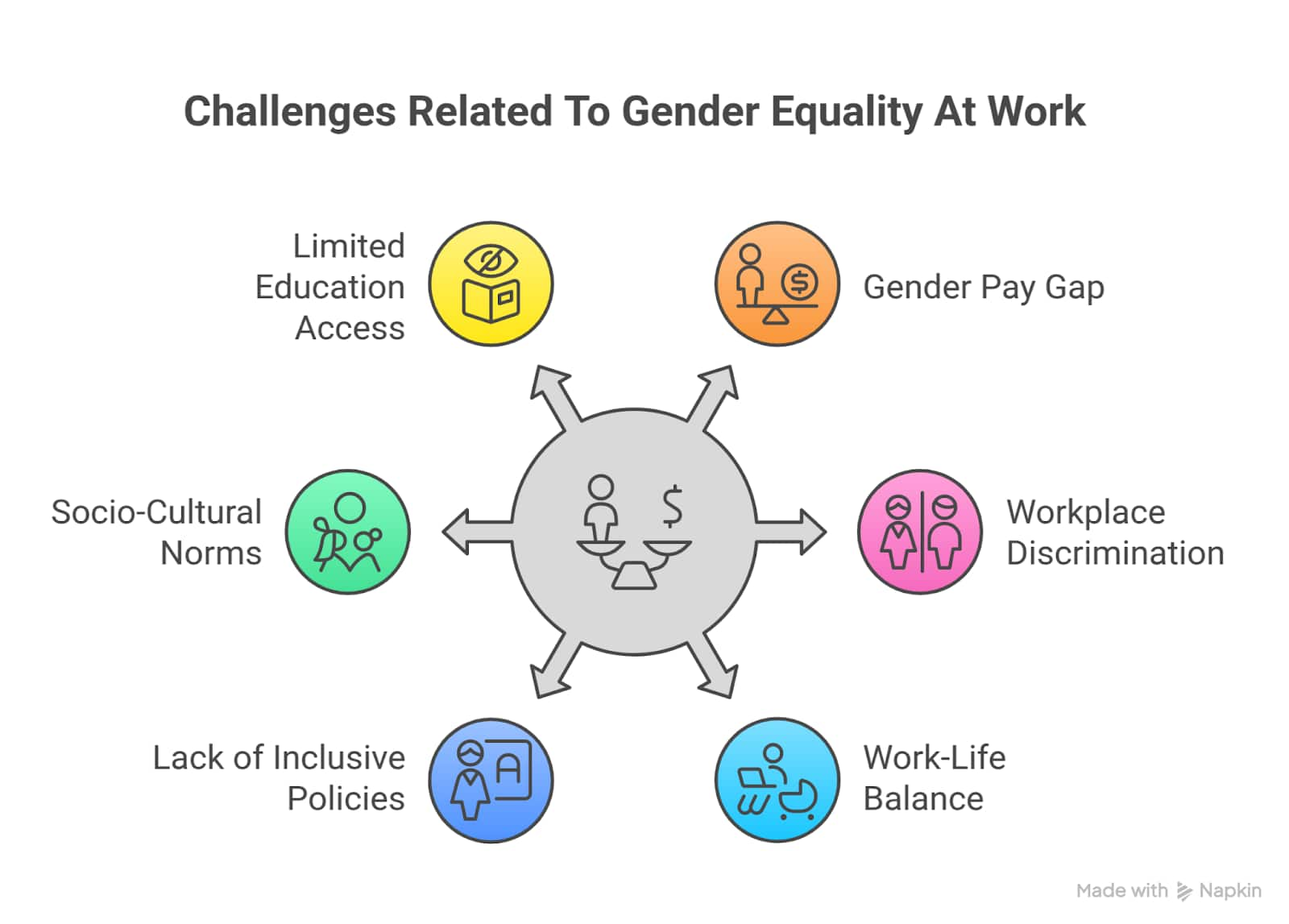Navrachana University BBA Admissions 2026
Ranked as the 3rd Best Private University in Gujarat by Education World
The digital revolution has transformed education and professional development. A PwC survey shows that most male and female employees are actively looking to upskill and expand their knowledge. This highlights the role of online degree courses in advancing gender equality in the workplace.

India holds the 129th position in the Global Gender Gap Index, raising the importance of online degree courses in bridging this divide. By providing flexibility, accessibility, and inclusive learning opportunities, online degree programmes empower women to gain core expertise and develop skills, thereby achieving gender equality in the workplace.
According to Mckinsey’s Women in the Workplace Report 2023, women in C-suite roles have increased from 17 to 28 percent, with significant progress at senior leadership levels. This rise showcases how online degrees empower women to upskill and advance into leadership roles, contributing to greater gender equality and inclusivity in the workplace.
As per the Center for Global Development, women held just over 17% of board positions in India in 2021. However, by 2023, this share dropped further to nearly 16% highlighting the wider gender gap in corporate leadership, outlining the need for online degree courses. The points mentioned below highlight the ways online education promotes gender equality at work:
Online education promotes gender equality by offering flexibility that traditional learning often lacks. It allows women to manage responsibilities while accessing classes, discussions, and assignments at their convenience. This model empowers many women to pursue higher education and career growth without compromising on personal or professional commitments.
Geographic barriers have restricted women’s access to education, especially in rural areas with limited infrastructure. Online degree courses remove these limitations, enabling women to study at prestigious institutions anywhere. Women in small towns can now gain the same high-quality education as someone living in an urban metropolitan area, thus fostering equal learning opportunities and broader career prospects.
Financial barriers often hinder women’s education, especially due to wage gaps and career breaks. Online degree courses with its lower costs offer a more accessible alternative. Over 77 UGC-approved universities in India provide affordable online degrees. This cost-effectiveness supports women re-entering the workforce or managing family responsibilities on limited incomes, promoting long-term career empowerment.
The modern workplace increasingly demands technical skills and digital literacy. Online degree programmes effectively equip learners with in-demand expertise in areas such as software development, digital marketing, and data analytics. For women, these skills open doors to higher-paying roles, and the self-paced format empowers them to invest additional time in upskilling without disrupting other responsibilities.
Online degrees equip women with leadership skills through courses such as an online MBA degree, covering strategic thinking, negotiation, and communication. These core expertise are essential and required for executive roles. Moreover, exposure to global perspectives and teaching styles enhances their adaptability and leadership potential in diverse work environments, helping them break barriers and advance professionally.
Online degree courses provide a greater pathway for career transitions, essential for women workers who need to change careers due to life circumstances, industry changes, or personal interests. These programmes help them to build foundational knowledge in new areas while also learning advanced concepts and skills relevant to their target roles.

Also Read: How an Online MBA Helps Empower Women?
Online degrees act as a practical way to upskill, switch careers, or return to the workforce, all without putting their jobs or personal responsibilities on hold. With the flexibility to learn at their own pace, online degree programmes are becoming a powerful tool for women seeking academic growth and professional advancement. The table below highlights the ways to make the right choice when it comes to online degrees for working women:
Online degrees are offered in two formats: fully online and hybrid. Fully online programmes provide maximum flexibility which is ideal for women balancing different schedules. Hybrid models mix online learning with occasional in-person sessions. Working women must choose based on their specific preferences and schedule, either go fully online for convenience or hybrid for face-to-face engagement and structured learning.
Accreditation ensures that online degrees meet established educational standards. Several Indian Universities offering online degrees are UGC approved and academically credited. Working women before enroling must check for UGC-DEB recognition and NAAC ratings, which ensures quality assurance, industry acceptance, and eligibility for further studies or government jobs.
Online degrees typically cost less than traditional programmes, but fees vary across universities. Working women must assess tuition fees, EMI options, scholarships, and hidden costs such as exam or application fees. Proper financial planning ensures affordability without disrupting ongoing responsibilities.
One of the greatest advantages of online degrees is their flexibility. Courses can be accessed anytime, anywhere, which is ideal for women juggling work, family, and education. Several universities also offer mobile access and recorded lectures, enabling continuous learning without compromising professional or personal duties.
Before enroling, working women must reflect on their goals, whether upskilling, changing careers or gaining a promotion. Self-discipline, time management, and motivation are essential for success in an online environment. Understanding one’s learning preferences and readiness helps in choosing a course that aligns with personal aspirations and professional objectives.
Online degree programmes reshape gender equality in the workplace, offering women flexible, affordable, and accessible learning paths. With government recognition and a skill-orientated curriculum, these programmes empower women to overcome barriers and rise into leadership roles, fostering inclusive growth and closing the professional gender gap.
Frequently Asked Questions (FAQs)
Most universities provide academic mentors, online discussion forums, recorded lectures, live classes, and doubt-clearing sessions to support working professionals throughout their learning journey.
Check if the programme is UGC-entitled or accredited by a recognised authority. Recognition ensures the degree’s validity for jobs or higher education.
Yes, online degrees offer flexible schedules, allowing working women to balance jobs, family, and studies without compromising on their professional or personal responsibilities.
Online MBA, MCA, data science, psychology, and digital marketing programmes equip women with leadership, technical, and creative skills for diverse, high-growth career paths.
Online degrees offer flexibility and accessibility, helping women balance education with personal responsibilities, leading to better job opportunities and bridging workplace gender gaps.
On Question asked by student community
There are several government and private colleges in India offering UGC-recognised Online MBA. Some of which are as follows:
Here are some useful article links for more read :
UGC Approved Online MBA Colleges in India 2026: Complete List, Fees,
There are several cheapest online MBA options like:
Visit the links for more details :
Anyone who has completed a bachelor's degree is eligible for Online MBA . For some online MBA courses, especially for Executive MBA, you will require at least 2-3 years of relevant work experience and sometimes a valid CAT, MAT, or GMAT score.
For more, read Online MBA Admission: Eligibility, Selection
Yes, an online MBA degree is UGC-recognised which making it highly relevant in 2026. It holds the same value and credibility as a on-campus programme. Due to its flexible nature, working professionals and graduates prefer an MBA in online, flexible mode to upskill themselves while working.
It’s not available everywhere — you need to target states/institutions that officially recognize the KM quota for MBA admissions.
Some examples of MBA colleges with Kashmiri migrant quota-
1-symbiosis Institute of Business Management (SIBM), Pune
2-FORE School of Management, Delhi
3-Central University of Odisha (Koraput)
Ranked among top 10 B-Schools in India by multiple publications | Top Recruiters-Google, MicKinsey, Amazon, BCG & many more.
Among top 100 Universities Globally in the Times Higher Education (THE) Interdisciplinary Science Rankings 2026
NAAC A++ Accredited | Ranked #12 by NIRF
Applications Deadline - 23rd March 2026 | Offers full-time PGP in International Master in business (IMB) Equivalent to MBA under following specializations Marketing, HR, Operations, and many more
Extended Application Deadline: 15th Feb | Globally Recognized by AACSB (US) & AMBA (UK) | 17.8 LPA Avg. CTC for PGPM 2025
NAAC A++ Accredited | AMBA & AACSB Member | Highest CTC 16.22 LPA | Merit-based Scholarships | Last Date: 19th Feb'26